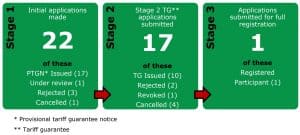AD benefits highlighted in Scottish Parliament debate On 6 January 2026, the Scottish Parliament held…
Ofgem publishes the 2023 GGSS Annual Report
The UK government’s Green Gas Support Scheme aims to increase the proportion of green gas in the national gas grid. This scheme provides financial incentives for new anaerobic digestion biomethane plants that can produce renewable ‘green gas’ from organic waste. The scheme’s second annual report charts solid early progress but flags key challenges ahead. The report provides an update on activity between 1 April 2022 and 31 March 2023.
Just one year since its launch, the scheme has attracted 22 applications and issued 10 tariff guarantees – a key step in the process before full registration. The first participant commenced injecting biomethane in April 2022 and by March 2023 had injected 246,292 m3 of biomethane, enough to heat approximately 159 typical UK homes for a year, or heat 697,000 hot baths. One periodic support payment of £104,860.84 was made during Scheme Year 2 to the registered participant. This early contribution is encouraging, but full uptake depends on more plants completing the registration process.
Application status so far;

The report indicates commissioning timeframes have slipped for most applicants due to planning delays and supply chain issues. If deployment continues to lag, it may hamper wider decarbonisation goals. During the Mid-Scheme Review, the government has consulted on extending the scheme’s closure date and commissioning deadlines to provide more flexibility, and currently, we are keeping an eye out for the outcome of the Review.
With the first levy payments made in May 2022, nearly £54 million has been collected to date. This levy on gas suppliers will fully fund the incentive payments. For now, costs are absorbed through general taxation to shield consumers from price rises under the Energy Price Guarantee. But ultimately households will pay, so value for money is critical.
The annual application budget cap is designed to control costs and has so far not been breached. However, with a substantial underspend to date, there are concerns over whether the projected biomethane volumes can be achieved. The government may need to reassess budget forecasts and incentives as more data comes in.
Overall, the Green Gas Support Scheme shows promising signs of supporting growth in the UK’s green gas capacity. But the industry still faces hurdles to scale up in the timeframe envisaged. Especially with the delay of separate food waste collections mandate, many AD plant developers are facing challenges in getting food waste contracts for the proposed AD plants, which further delays the application process. The scheme’s flexibility and effectiveness in driving investment remain critical for decarbonisation and reaching net zero emissions by 2050. Careful stewardship and rigorous scrutiny will be vital to ensure its success.
